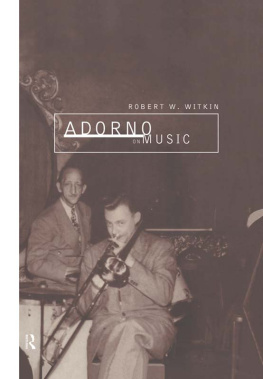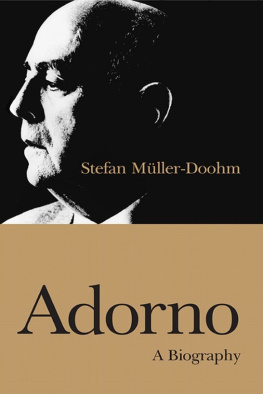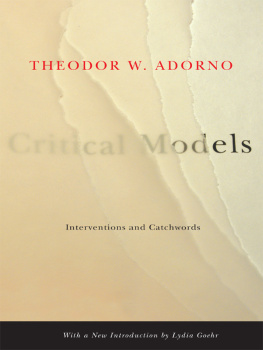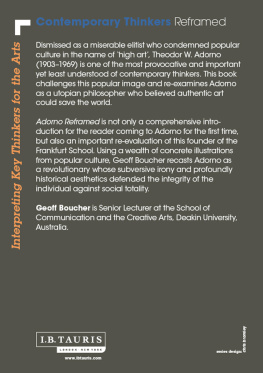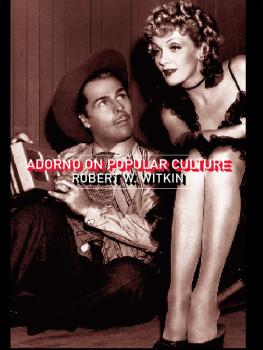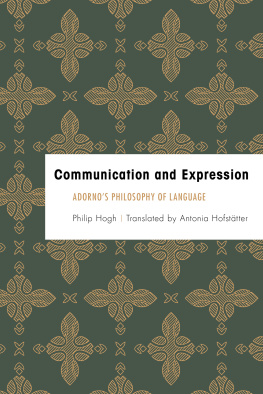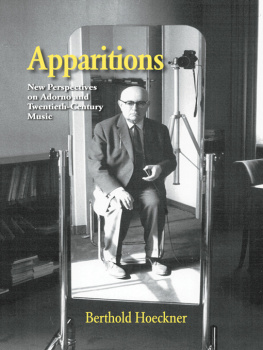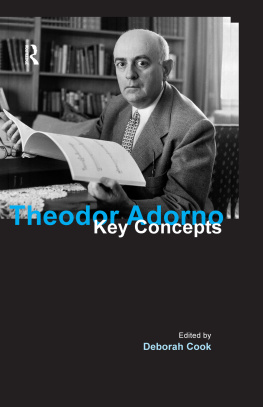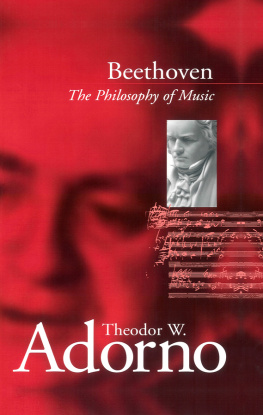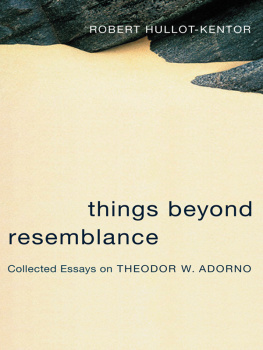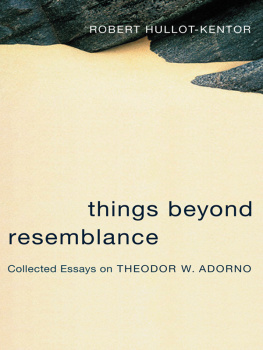ADORNO ON MUSIC
More than half of the published works of Theodor Adorno were devoted to his studies in music. As his reputation has grown in recent years, however, Adornos work on music has remained a neglected area because of its musicological complexity.
This is the first detailed account of Adornos texts on music from a sociological perspective. In clear, non-technical language, Robert Witkin guides the reader through the complexities of Adornos argument about the links between music and morality and between musical works and social structure. Separate chapters address his treatment of Beethoven, Wagner, Mahler and Berg, Schoenberg, Stravinsky and finally jazz. Throughout, Witkin develops a sociology of the art work within which Adornos writings on music can be understood. It was through these works more than any others that Adorno established the right of the arts to be acknowledged as a moral and critical force in the development of a modern society. By recovering them for non-musicologists, Witkin adds immeasurably to our appreciation of this giant of twentieth-century thought.
Robert W. Witkin is Senior Lecturer in Sociology at the University of Exeter and the author of Art and Social Structure (1995).
INTERNATIONAL LIBRARY OF SOCIOLOGY
Founded by Karl Mannheim
Editor: John Urry
Lancaster University
ADORNO ON MUSIC
Robert W. Witkin
First published 1998
by Routledge
2 Park Square, Milton Park, Abingdon, Oxon, OX14 4RN
Simultaneously published in the USA and Canada
by Routledge
270 Madison Ave, New York NY 10016
Reprinted 1999
Transferred to Digital Printing 2005
Routledge is an imprint of the Taylor & Francis Group
1998 Robert Witkin
Typeset in Garamond by Routledge
All rights reserved. No part of this book may be reprinted or reproduced or utilised in any form or by any electronic, mechanical, or other means, now known or hereafter invented, including photocopying and recording, or in any information storage or retrieval system, without permission in writing from the publishers.
British Library Cataloguing in Publication Data
A catalogue record for this book is available from the British Library
Library of Congress Cataloguing in Publication Data
A catalogue record for this book has been requested
ISBN 0-415-16291-2 (hbk)
ISBN 0-415-16292-0 (pbk)
CONTENTS
ACKNOWLEDGEMENTS
The suggestion that I should write a book on Adornos studies of music initially came from my colleague at Exeter, Tia DeNora. I am grateful to her for the push she gave the project by generously handing me her considerable file of bibliographic materials on Adornos work. I wish to express my warmest thanks to Martin Jay who very kindly set aside time in the busiest of schedules to read and comment in some detail on earlier drafts of three of the chapters. I am grateful, too, to all my colleagues in the Department of Sociology at Exeter for helping to provide the study leave in which the book was written. Finally, I would like to thank the Senior Sociology Editor at Routledge, Mari Shullaw, for believing in and supporting the project even after it was apparent that it had grown, like Topsy.
1
MUSICA MORALIA
There is a Zen Buddhist description of Zen truth as being like a ball of fire stuck in your throat: you cant get it up but neither can you get it down. This uncomfortable image can easily be fitted to the idea of truth which informs the work of Theodor Adorno. It is impossible to read Adorno without hearing, in the authorial voice, all those signs of high bourgeois cultural sensibility, of a bourgeois sense of truth, individuality, freedom, humanity, suffering. But in Adornos writings, the world which might make sense of that authorial sensibility, the world of the heroic phase of an entrepreneurial capitalism, is fast disappearing and is being supplanted by a monolithic, rational-technical commodity capitalism. The poisonous gas of that totalitarian world, its anaesthetic, is the dream-stuff pumped out by the culture industry, by the Hollywood dream machine, Tin Pan Alley, advertising jingles, lollipop music concerts, jazz, radio and so forth.
Adorno was closer than his modern readers to Auschwitz and to all which that implied. For him, Tin Pan Alley, Stravinsky, Hollywood, jazz and the culture industry belonged however bizarre it might seem to many modern readers in a configuration which included Auschwitz. In his aesthetic sociology he set, in powerful opposition, all those products of mass popular culture on the one hand, and the works of avant-garde musicians in the classical tradition on the other. Within the latter category, he set up a further opposition; on one side there was serious and responsible music true music which developed, to the highest degree possible, the historical tendencies inherent in the musical material and which conveyed the truth of the human condition the suffering of the subject in late capitalist society; and on the other side, the enemies of musical truth, musicians who did not acknowledge the obligations imposed by the historical demands of the musical material, musicians who retreated behind some notion of a world of pure musical effects and who sought musical models that were remote from the demands of the present, embracing primitivism and neo-classicism. Adorno saw these latter musicians as annihilating the subject and extinguishing genuine expression, ultimately as collaborating with the forces of oppression and alienation. Mahler, Schoenberg, Berg, Webern and the second Viennese school of composition provided him with his principal exemplars of music high in truth-value, while Stravinsky, Hindemith and the neo-classical composers were assigned to the camp of the enemies of true music.
More than half of Adornos published works were devoted to his studies in music. Arguably, these studies represent the most formidable contribution so far to the development of a sociological theory of modern music and, more widely, of aesthetic modernity. As Harold Blumenfeld put it:
The writings of Theodor Wiesengrund Adorno have stirred up a whirlwind which has cut a widening swathe across the musical thought of the entire middle half of this century. Adorno always provocative, sometimes provoking places the musical act under a scrutiny which is at once exhaustive and multidimensional. His critique remains unexampled in terms of the sheer multiplicity of vantage points from which it probes its subject. Rooted in Hegel, Marx and Freud, his thought is often complex and complicated in expression factors which have tended to make it stick in the throats of friends and foes alike.
(H. Blumenfeld 1991:263)
Belonging, as he did, so completely to music, philosophy and sociology, Adorno possessed all the cultural capital necessary for the task of constructing a sociology of the musical art work. Moreover, his credentials could not easily be challenged by musicologists. How many of them could boast, as could Adorno, of a sophisticated musical training as a pupil of the best teachers among them Alban Berg of membership of the avant-garde Viennese circle surrounding Schoenberg, of being in touch often having close personal contact with some of the foremost philosophical and musical talents of his day and of being a practising composer and a skilful instrumentalist for whom the choice between philosophy and a career as a professional musician had been a real one? Adornos credentials for writing about music were clearly beyond question and his name, at least, is widely known among music specialists.
Next page
